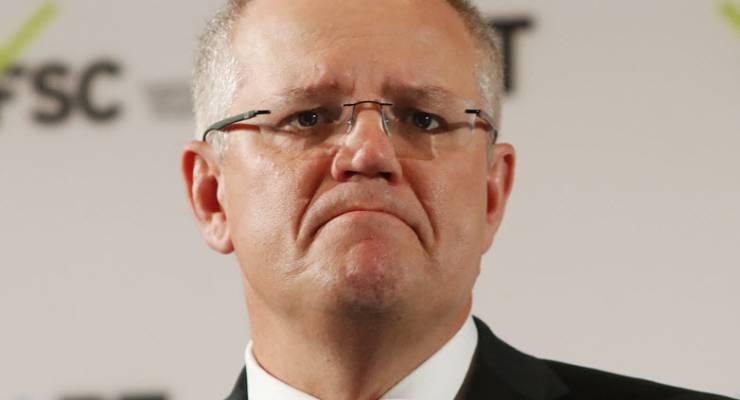
The jobless rates, housing, productivity, wages, tax avoidance, national net worth, and the ballooning debt all added to federal Treasurer Scott Morrison’s October tribulations. And now the state treasurers have formed their own club to circumvent him. The humiliation is pretty comprehensive.
State and territory treasurers – two Coalition and six Labor – agreed late last week to establish a new board of treasurers. This seeks to resolve “frustration amongst the states about issues” which “require greater autonomy for the good of our communities and of the nation.”
The breakaway body is led by NSW Treasurer Dominic Perrottet – from Morrison’s own branch of the Liberal Party – and Victorian Labor’s Tim Pallas.
This is a snub to the Council on Federal Financial Relations (CFFR) which was established in the early Rudd years to provide a forum for all treasurers – state, territory and federal – to handle matters of mutual concern. Often referred to as “the treasurers’ COAG”, the CFFR is chaired by the federal treasurer. The new board excludes him altogether.
Issues reportedly motivating the monetary meetings minus Morrison include:
- Fairer distribution of GST revenues;
- concern that state power to provide for their disadvantaged citizens is being overridden;
- specifically, dismay at proposed Turnbull Government legislation on how homelessness funding must be spent; and
- general disquiet at commonwealth encroachment on state autonomy.
A scathing assessment of federal Treasurer Morrison was delivered in a high profile speech last week by Victoria’s Tim Pallas.
“States need to be treated as partners, not serfs,” by the federal government, Pallas said. “There needs to be a reset of the chaotic and punitive approach we have seen to date” by an administration which “goes out of its way to be unpredictable and unreliable”.
A top ten of Morrison’s other setbacks announced in October include:
- Net debt blew out by $5.1 billion in September to an all-time high of $337.7 billion.
- Gross debt expanded in September by $2.9 billion, and by another $4.7 billion up to October 27th. This is now at a record $506.1 billion.
- The nation’s net worth collapsed in September by $6.5 billion to negative $403.2 billion. This reverses the trend for a few months earlier this year when booming trade and record company profits appeared to be clawing back net worth which had plummeted through 2015 and 16.
- Credit Morrison has claimed for clawing back billions in taxes avoided by dodgy corporations was undermined last week by the Tax Office.
A Senate estimates hearing asked Deputy Commissioner Mark Konza how much tax had been recovered under the Coalition’s laws. He replied, “nil”. Konza then explained that most recovered tax was due to Labor’s legislation passed in 2012. The Liberal Party had opposed those laws. - “Income growth, particularly for wage earners, has stalled. Labour productivity is lower than both the ‘golden era’ of the mid-1990s, and the lengthy prosperous period from 1950 to 1970.”
That’s according to the Productivity Commission’s major report released this month. The Commission claims the “key issue will be to ensure that future economic, social and environmental policies sustain inclusive growth.” This, it reported, is “by no means guaranteed given current policy settings.” Ouch! - The Commonwealth Bank lectured the Government on its appalling wage outcomes. “There’s a market failure here, in a way, and governments are there to sort out market failures,” scolded CBA’s chief economist Michael Blythe.
- Job figures show 711,500 people unemployed. For 11 months now, the total has been above 710,000. The last time that happened before the Coalition was elected was in 1997.
- Workers unemployed for more than a year number 156,200. That’s up 17.6% since 2013, compared with a 5.9% population rise.
This has been above 150,000 for the entire period Morrison has been treasurer. It never exceeded 132,800 under Labor. - The average time the jobless now spend looking for a job is now 50.04 weeks. That is five weeks longer than when Morrison became treasurer and 11 weeks longer than when the Coalition took office.
- Housing approvals in August were just 18,514. That is 15% below August last year and 3% below August 2015. It is below the average monthly approvals for the last four financial years — 18,689.
Fortunately for Morrison, the media – and the voters – are now focussing on Coalition disasters other than the economy.








Crikey is committed to hosting lively discussions. Help us keep the conversation useful, interesting and welcoming. We aim to publish comments quickly in the interest of promoting robust conversation, but we’re a small team and we deploy filters to protect against legal risk. Occasionally your comment may be held up while we review, but we’re working as fast as we can to keep the conversation rolling.
The Crikey comment section is members-only content. Please subscribe to leave a comment.
The Crikey comment section is members-only content. Please login to leave a comment.